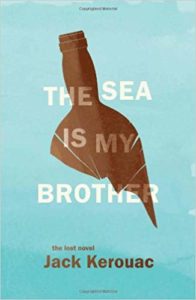 Since the death of Kerouac in 1969, a lot of publications have been discovered and re-discovered among his scribblings and his estate has over the years, kept releasing new material from poetry books to new novels and early writings, and this time around, The Sea is my Brother is the latest “lost novel” to be released through Penguin Classics.
Since the death of Kerouac in 1969, a lot of publications have been discovered and re-discovered among his scribblings and his estate has over the years, kept releasing new material from poetry books to new novels and early writings, and this time around, The Sea is my Brother is the latest “lost novel” to be released through Penguin Classics.
This is the first novel that Jack wrote but it is more of a novella. It is short, actually very short and to me seems like a work in progress that Jack never got around to finishing. It was written around 1942-1943 while he was a young 20-year-old merchant seaman. The book in question is full of early writings, short stories, a play, and letters to his friend Sebastian Sampas, and the actual novel amongst all this only takes up less than a third of the book.
The novel follows two characters like a lot of Jacks books, this time we have Wesley Martin, a young carefree heavy-drinking seaman who befriends Bill Everhart, an intellectual lecturer, and together they ship of to Greenland with a boat load of war cargo, an actual journey Jack had partaken himself.
In reality, that is really all this story is about in this novel, with some drinking, bar hopping and womanising at the beginning. There are a few other characters involved on the boat that you want to get to know more about but the novel ends too soon for this to happen which really leads me to believe that Jack was not yet finished with this book.
But, upon reading this novel, it does give you a picture of the writer that Jack was about to become. With this novel you will get the feeling of an immature writer especially in his use of the word “cool” which pops up a lot, yet at times it explodes with typical Kerouac jazz-infused prose that can blow you away and gives insight to a new development and technique in the making that Jack would later develop and master (spontaneous prose).
This is no perfect novel though. The plot, if you could call it a plot, is minimal and can be seen as uninteresting. Sometimes the point-of-view randomly switches leaving the reader a little lost. But, in Wesley, you can feel and see a young Jack that would go on to create many more characters like this and create the Duluoz Legend (the name given by Jack to the novels that constituted the major body of his work)
Wesley is another wanderer of Jacks creations, the hobo, free-spirited and a free-thinker, the type of “where ever I lay my hat” person that would soon be seen in On the Road, Big Sur and my personal favorite, The Dharma bums. Bill, on the other hand, is the book intelligent thinking man, the dreamer, the controlled and wise, and both characters are really personality’s of Kerouac, adventurers, young, intelligent and wild, seeking the next life experience.
I recommend this book to all Kerouac fans like myself, only to see the immaturity and development of a brilliant writer and legend. It is not great work, and this leads me to question if Jack were alive to day, would this be published. I believe it would be, but would be a completely different book, longer with much more plot and character development, tidier, faster and written in the famous Kerouac spontaneous prose we all have come to love and know.
But, if you have never read a Kerouac book, then stay well clear, as this could turn you of a genius writer that Jack is. As to me, this is certainly unfinished. The book is worth it though for the extra material available in this collection, short stories, a play, and the letters and correspondence between Kerouac and his childhood friend – Sebastian Sampas. A decent read, but not the Kerouac I know.
Where To Find It?
This book should be easy enough to locate so check out your local book store and if you can not find it check out the deals at Amazon. Or if you know me, feel free to borrow.
About The Author
Jack Kerouac was born in Lowell, Massachusetts in 1922. In 1947, enthused by bebop, the rebel attitude of his friend Neal Cassady, and the throng of hobos, drug addicts and hustlers he encountered in New York, he decided to discover America and hitchhike across the country. His writing was openly autobiographical and he developed a style he referred to as ‘spontaneous prose’ which he used to record the experiences of the Beat Generation. Among his many novels are On the Road, Visions of Cody, The Subterraneans, The Dharma Bums and Big Sur. He died in 1969.